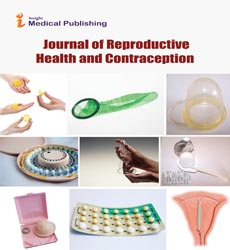Bariatric Surgery Complications occurs in Women in Modern Era
Richard Paul*
Richard Paul*
Department of Gynaecology,Centre for Public Health, Vienna, Austria
- *Richard Paul:
- Richard Paul
Department of Gynaecology
Centre for Public Health, Vienna, Austria
E-mail: paulrichard@yahoo.com
Received Date: November 01, 2021; Accepted Date: November 06, 2021; Published Date: November 11, 2021
Citation: Paul R 2021 Bariatric Surgery Complications occurs in Women in Modern Era. J Contracept Stud Vol 6 No.11:15 .
Obesity is an illness that is becoming more common. Obesity surgery is no longer debatable in cases of severe obesity, as it results in not only long-term weight loss and an improvement in life expectancy, but also a reduction in obesity-related comorbidities, particularly type-2 diabetes. As a result of the obesity pandemic, the number of so-called bariatric surgeries, which are primarily performed laparoscopic ally, has increased (more than 30,000 procedures in France in 2011, up 76% between 2009 and 2011). As a result, people who have undergone surgery are consulting their general practitioner and emergency rooms more frequently. Doctors are already familiar with the emergency management of obesity-related comorbidities such as diabetic decompensating, hypertension flare-ups, and respiratory failure, among others. On the other side, they are less confident in their ability to manage an obese patient. Simple post-operative tachycardia in obese patients is a warning signal and should be treated seriously. Dehydration is the most prevalent cause; however pulmonary embolism or a surgical complication like an anastomotic fistula should also be investigated. As a result, it is now common practise to state that "a tachycardia of more than 120 beats per minute is a signal for surgical investigation unless there is confirmation to the contrary." Two cases of post-operative thyrotoxicosis resulting in tachycardia have previously been reported. Peritonitis from anastomotic fistula formation is the most prevalent post-surgery complication. This is a common early complication that arises within the first 10 days after surgery and has a high incidence.
Following gastric bypass, 1 to 6% and 3 to 7% after sleeve gastrostomy. Because there is no abdominal wall and hence no guarding or rigidity, the traditional indications of peritoneal irritation are never evident in the obese patient. An increase in fever, stomach heaviness, hiccups, tachycardia, and sudden urine retention are all non-specific indications to look out for. If there is even the slightest suspicion, a surgical consultation is essential. If left untreated, a fistula can lead to sepsis, which can lead to acute renal and respiratory failure. After a sleeve gastrostomy, a fistula can form up to three months after surgery, and in 90% of instances, it is located at the upper level of the stapling (cardia). Dysphagia, left hypochondria or shoulder pain, and possibly hiccups are all possible symptoms. It's possible that ACT or intestinal opacification will result in a false negative. If there is even the slightest question, more surgical examination should be done as soon as feasible.
Post-operative malnutrition is uncommon after restrictive surgery (ring, sleeve gastrostomy), but it can happen after mal absorptive surgery (bypass, biliary pancreatic shunt), and it is caused by the restriction and change in absorption. The initial 600 calories of post-operative food intake should be in liquid form, gradually increasing to 800 to 1200 calories per day, including 60 grams of protein. Furthermore, malabsorption of minerals, trace elements, lipid and water soluble vitamins, calcium, magnesium, iron, intrinsic factor, and vitamin B12 is caused by the removal of the first part of the small bowel. The duodenum absorbs iron and calcium, which explains the risk of post-operative anaemia after bypass or billion-pancreatic shunting, which occurs in 20 to 50% of patients. Vitamin D deficiency might result if the Y loop is too long. Osteoporosis and osteomalacia are the long-term risks. After gastric bypass, cases of secondary hyperparathyroidism have been reported.
Obesity surgery is warranted since it results in long-term weight loss, higher life expectancy, and a reduction in obesity-related comorbidities. As a result, an increasing number of people are undergoing treatment. This operation management of infectious diseases must be understood by general practitioners and emergency departments. These sufferers Complications are uncommon, but the most insidious are deficits that can occur as a result. Neurological issues that are irreversible if there is even the slightest question, a medical or surgical examination is recommended. A consultation with an expert in the care of obese patients should be obtained. The risk of death rises as a result of a delayed diagnosis.
Open Access Journals
- Aquaculture & Veterinary Science
- Chemistry & Chemical Sciences
- Clinical Sciences
- Engineering
- General Science
- Genetics & Molecular Biology
- Health Care & Nursing
- Immunology & Microbiology
- Materials Science
- Mathematics & Physics
- Medical Sciences
- Neurology & Psychiatry
- Oncology & Cancer Science
- Pharmaceutical Sciences
